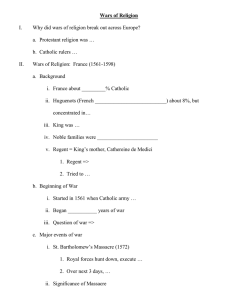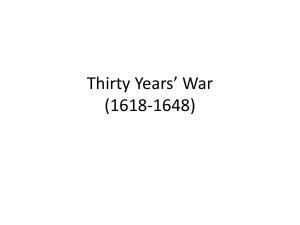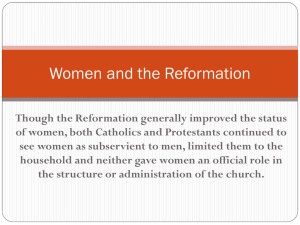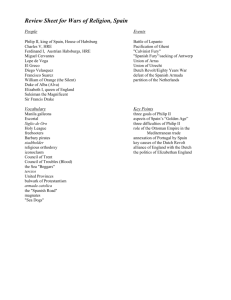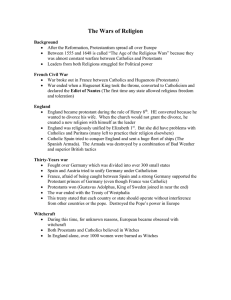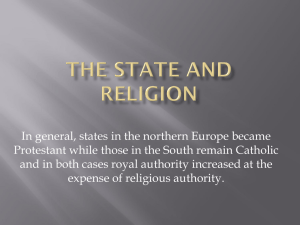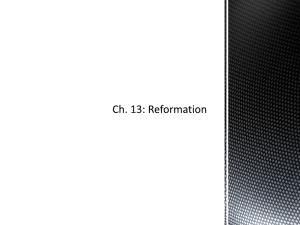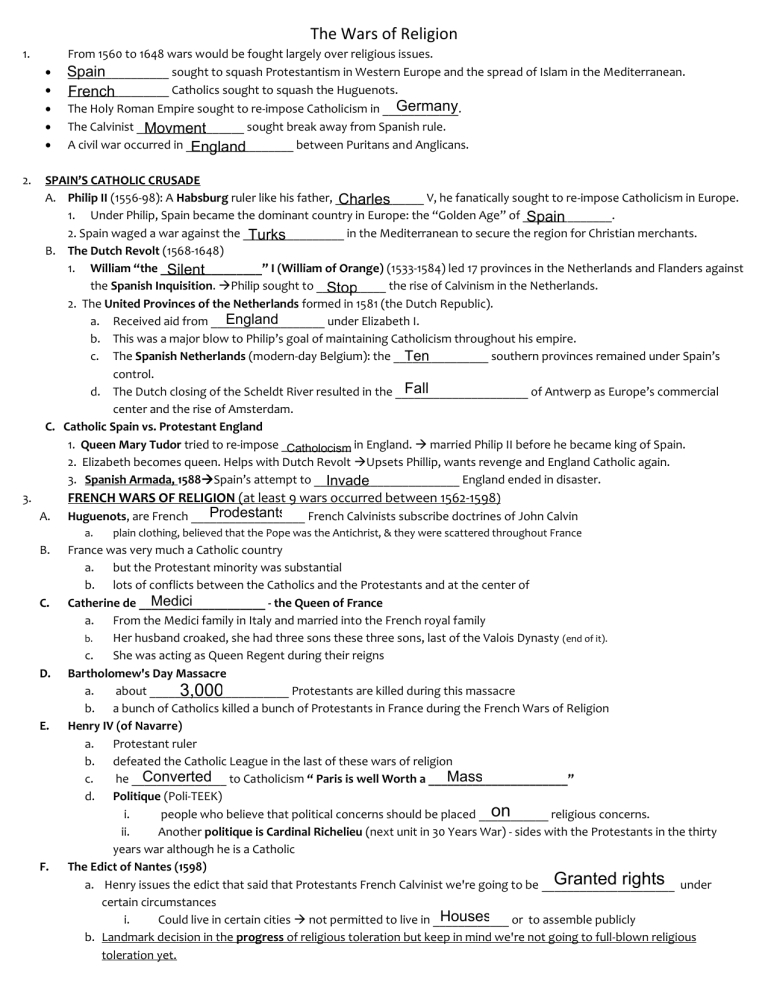
The Wars of Religion 1. From 1560 to 1648 wars would be fought largely over religious issues. ________________ sought to squash Protestantism in Western Europe and the spread of Islam in the Mediterranean. Spain ________________ Catholics sought to squash the Huguenots. French Germany The Holy Roman Empire sought to re-impose Catholicism in ____________. The Calvinist _________________ sought break away from Spanish rule. Movment A civil war occurred in _________________ between Puritans and Anglicans. England 2. SPAIN’S CATHOLIC CRUSADE A. Philip II (1556-98): A Habsburg ruler like his father, ______________ V, he fanatically sought to re-impose Catholicism in Europe. Charles 1. Under Philip Spain became he dominan co n r in E rope he Golden Age of Spain _______. 2. Spain waged a war against the ________________ in the Mediterranean to secure the region for Christian merchants. Turks B. The Dutch Revolt (1568-1648) 1. William the Silent I William of Orange (1533-1584) led 17 provinces in the Netherlands and Flanders against the Spanish Inquisition. Philip sought to ___________ the rise of Calvinism in the Netherlands. Stop 2. The United Provinces of the Netherlands formed in 1581 (the Dutch Republic). England a. Received aid from __________________ under Elizabeth I. b. This as a major blo o Philip s goal of main aining Ca holicism hro gho his empire c. The Spanish Netherlands (modern-da Belgi m he Ten so hern pro inces remained nder Spain s control. d. The Dutch closing of the Scheldt River resulted in he Fall of An erp as E rope s commercial center and the rise of Amsterdam. C. Catholic Spain vs. Protestant England 1. Queen Mary Tudor tried to re-impose ___________ married Philip II before he became king of Spain. Catholocism in England. 2. Elizabeth becomes queen. Helps with Dutch Revolt Upsets Phillip, wants revenge and England Catholic again. 3. Spanish Armada, 1588 Spain s a emp o Invade England ended in disas er 3. FRENCH WARS OF RELIGION (at least 9 wars occurred between 1562-1598) Prodestants French Calvinists subscribe doctrines of John Calvin A. Huguenots, are French __________________ a. B. C. D. E. F. plain clothing, believed that the Pope was the Antichrist, & they were scattered throughout France France was very much a Catholic country a. but the Protestant minority was substantial b. lots of conflicts between the Catholics and the Protestants and at the center of Medici Catherine de ____________________ - the Queen of France a. From the Medici family in Italy and married into the French royal family b. Her husband croaked, she had three sons these three sons, last of the Valois Dynasty (end of it). c. She was acting as Queen Regent during their reigns Bartholomew's Day Massacre a. about ______________________ Protestants are killed during this massacre 3,000 b. a bunch of Catholics killed a bunch of Protestants in France during the French Wars of Religion Henry IV (of Navarre) a. Protestant ruler b. defeated the Catholic League in the last of these wars of religion Mass Converted to Catholicism Paris is well Worth a ______________________ c. he _______________ d. Politique (Poli-TEEK) on i. people who believe that political concerns should be placed ___________ religious concerns. ii. Another politique is Cardinal Richelieu (next unit in 30 Years War) - sides with the Protestants in the thirty years war although he is a Catholic The Edict of Nantes (1598) Granted rights under a. Henry issues the edict that said that Protestants French Calvinist we're going to be _____________________ certain circumstances Houses or to assemble publicly i. Could live in certain cities not permitted to live in ____________ b. Landmark decision in the progress of religious toleration but keep in mind we're not going to full-blown religious toleration yet. Bourbon Henry establishes a new dynasty the House of __________________________ a. which would continue to rule France all the way to the time of the French Revolution G. 4. THIRTY YEARS’ WAR (1618-1648) most important war of the 17th century Effects A. __________________________ of the Peace of Augsburg, 1555 B. 1. 2. 3. 4. 1. The agreement had given German princes the right to choose either Catholicism or Lutheranism as the official religion of their states within the HRE. 30 2. The truce in Germany lasted for _____years until factionalism in the Holy Roman Empire precipitated a cataclysmic war. Four phases of the war: Bohemian Phase (1618-1625) a. Defenestration of Prague (1618): it triggered war in Bohemia b. Protestant forces were eventually _____________ Defeated and Protestantism was eliminated in Bohemia. Height Danish Phase (1625-29): this represented the ______________ of Catholic power during the war a. Albrecht von Wallenstein (1583-1634): he was a mercenary general who was hired by the emperor to fight for the HRE. b. Edict of Restitution (1629): The Emperor declared all church territories that had been secularized since 1552 to be Restored automatically _____________________ to Catholic Church Liberated Swedish Phase (1629-1635): Protestants _______________ territory lost in the previous (Danish) phase Pushed a. Gustavus Adolphus (r. 1611-1632) King of Sweden: he led an army that _________________ Catholic forces back to Bohemia. Annulled the Edict of Restitution. b. In response, the Holy Roman Emperor reluctantly _____________ Felt c. The Swedish army was defeated in 1634; France now ___________ a resurgence of Catholicism in the HRE. French Phase In erna ional Phase -1648) a. Cardinal Richelieu (1585-1642) of France allied with the Protestant forces to defeat the HRE. Religious b. Richelie s policies reflec ed Ca holic France s paramo n diploma ic concerns as Political no thus he can be seen as a politique. Had the Habsburgs won in Germany, France would have been confronted with a more powerful German state on its eastern border. C. Treaty of Westphalia (1648) Ended 1. It __________________ the Peace of Augsburg but added Calvinism as a politically accepted faith. Protestant a. In effect, it ended the __________________ Reformation in Germany. b. It guaranteed that Germany would remain DIVIDED politically and religiously for centuries. 2. The dissolution of Holy Roman Empire was now confirmed. Independencefrom Spanish rule. a. The Netherlands and Switzerland gained their _________________ b. 300+ German states became sovereign. Denied c. The pope was _______________ the right to intervene in HRE affairs. Gained 3. France, Sweden, and Brandenburg (future Prussia) received various territories and ____________________ international stature. Weakened 4. The two Hapsburg branches were _______________________: a. The Spanish Hapsburgs saw their empire decline dramatically thereafter. b. The Austrian Hapsburgs lost much influence in Germany. D.Res l s of he Thir Years War Very 1. Germany was ___________________________ devastated (about 1/3 of the population perished; as high as 50% in certain areas). 2. Germany was further divided by the decline of the Holy Roman Empire. Religion Ended 3. It _________________ the wars of _____________________. France 4. It marked the beginning of the rise of _________________ as the dominant European power; it also accelerated the continued rise of England, the Netherlands, and Prussia. Balance of power ____________________ emerged in Europe. had Summary The 1500 and 1600s were times of regligous strugle __________________________________________________________________________________________________ __________________________________________________________________________________________________
